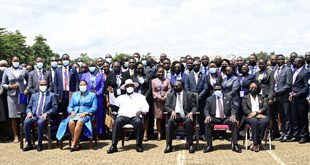
Kampala, Uganda | THE INDEPENDENT | The entrance of Uganda to the Extractive Industries Transparency Initiative – EITI, a global partnership for mineral resources accountability has excited Civil Society Coalition in oil and gas.
Uganda as a prospective oil resource mining country was early this month admitted into the EITI community whose principles require member states and companies to make public disclosure about their mineral wealth management processes for accountability purposes.
The EITI is a synchronized idea generated at the Lancaster house conference which convened in London in 2003. It sets out standards of disclosure of all information along the extractive industry value chain from the point of extraction, revenue generation and sharing, awarding of contracts and licenses, to final expenditure of all proceeds.
James Muhindo, the national coordinator of the Civil Society Coalition on Oil and Gas-CSCO says this is a big commitment they have all along been waiting for from government given the history of altercations that were involved in the initial stages of signing Uganda’s oil contracts.
In their joint statement read at their stakeholders consultative meeting in Masaka, Muhindo indicated that Uganda’s admission into the EITI community creates some levels of confidence to effective management of the mineral resources for the benefit of the citizens.
The initiative once effectively implemented will according to the statement help close the procedural loopholes that could easily be exploited by both the local and multinational companies to squander and abuse revenues from the country’s mineral resources. Muhindo says that putting in place clear public accountability channels enables the citizens and other stakeholders to effectively track every process undertaken in the sector and eventually put the duty bearers to account.
He however adds that they are now looking forward to pushing for inclusive participation of all categories of people for purposes of ensuring equitable sharing of the benefits and mitigating the negative impacts on biodiversity.
Siraj Magara, a policy specialist at the Civil Society Budget Advocacy Group-CSBAG indicates that Uganda’s admission to the protocol presents a great opportunity that will possibly end the tendencies of a few people enriching on the country’s mineral wealth at the expense of the general population.
Uganda is estimated to have potential of about 7 billion barrels of oil whose exploration is due.
Magara adds that besides the oil wealth that has lately attracted much of the public attention, the citizens will also have the opportunity to get clear information on the management of revenues generated from a variety of other mineral resources in the country.
Notably, Uganda became the 54th member country of the EITI and the 26th African country to join the initiative.
A statement by the Minister of Finance, Planning and Economic Monitoring Matia Kasaijja shortly after the admission in the community, indicates that Uganda made a freewill to join the protocol after appreciating the benefits of transparency towards developing of its natural resources sector.
******
URN
 The Independent Uganda: You get the Truth we Pay the Price
The Independent Uganda: You get the Truth we Pay the Price


